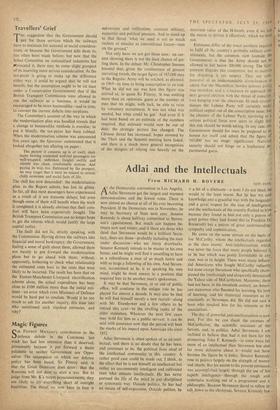Magic Figures
SIR FrIZROY MACLEAN'S contribution to the defence debate in the Commons last week has had less attention than it deserved, presumably because it put forward a thesis palatable to neither Government nor Oppo- sition. The assumption on which our defence policy has been based, Sir Fitzroy said, is that the Great Deterrent does deter : that the Russians will not dare to start a war. But to judge from Mr. K's recent pronouncements, they are likely to try everything short of outright hostilities. The threat we now have to face is subversion and infiltration; constant military, economic and political pressure. And to stand up to that threat 'what we need is not so much rockets or missiles as conventional forces—men on the ground.'
Not only have we not got those men : on cur- rent showing there is not the least chance of get- ting them. In the debate Mr. Christopher Soames boasted that, given the continuance of present recruiting trends, the target figure of 165,000 men in the Regular Army will be reached, as planned. in 1963—in time to bring conscription to an end. What he did not say was how this figure was arrived at; to quote Sir Fitzroy, 'it was nothing more than an optimistic guess at the number of men that we might, with luck, be able to raise by voluntary recruitment. It was not what was needed, but what could be got.' And even if it had been based on an estimate of the numbers required, that estimate would now be out of date; the strategic picture has changed. The Chinese threat has increased; hopes aroused by the Thaw and the Summit meeting have faded; and there is a much more general recognition of the dangers of relying too heavily on the deterrent value of the *bomb, even if %Ne hard 14 (I the means to deliver it effectively, which we have ltii not. Estimates differ of the exact numbers required to fulfil all the country's probable military col mitments, but the common view (outside the Government) is that the Army should not he allowed to fall below 200,000 strong. The Gov- ernment disputes this contention: but its motives for disputing it, are suspect. They are coi pounded of an understandable disinclination 10 admit that the Macmillan /Sandys defence policy was mistaken, and a reluctance to approach the next general election with the threat of conserir non hanging over the electorate. In such circuit). stances the Labour Party will certainly make political capital out of the conscription issue: hot the chances of the Labour Party.Surviving as a serious political force now seem so slight that this risk should be worth taking. In any case, the Government should for once be prepared to be honest for itself and admit that the figure of 165,000 has no magic significance. National security should not hinge on a haphazard ( e' partmental guess.


































 Previous page
Previous page